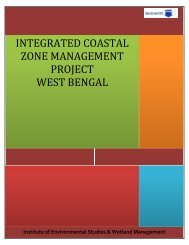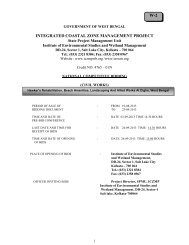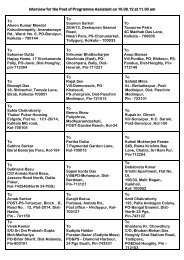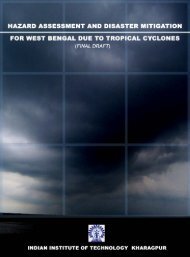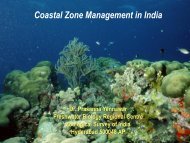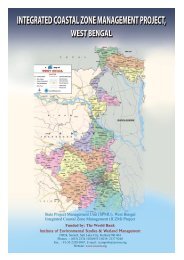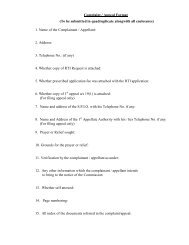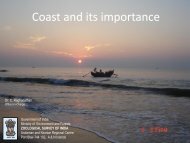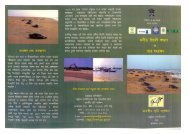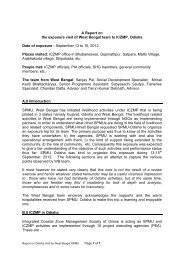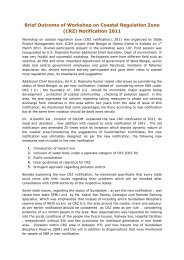INDIA: Integrated Coastal Zone Management Project
INDIA: Integrated Coastal Zone Management Project
INDIA: Integrated Coastal Zone Management Project
You also want an ePaper? Increase the reach of your titles
YUMPU automatically turns print PDFs into web optimized ePapers that Google loves.
<strong>INDIA</strong> <strong>Integrated</strong> <strong>Coastal</strong> <strong>Zone</strong> <strong>Management</strong> <strong>Project</strong> (P007985)<br />
First Implementation Support Mission, June 2011<br />
Activity Current Progress Agreed Next Steps & World Bank Recommendations<br />
3. Village Stakeholder meetings have been organized in 26 (of the<br />
planned 80 villages), and with 221 SHGs (of the planned 600 SHGs) in<br />
fishing villages in the priority investment stretches. Capacity building<br />
training has been completed for 77 SHGs, and skill upgradation<br />
training has been completed for 16 SHGs. A total of 22 SHGs have<br />
been provided with an advance of Rs.50,000 each during the project<br />
launch workshop organized at a fishing village where the Union<br />
Minster for Environment participated.<br />
4. The activities that have been identified in consultation with the 221<br />
SHGs include composite pisciculture (43 SHGs), scampi culture (9<br />
SHGs), shrimp culture (1 SHG), fish seed rearing (4 SHGs), sea bass<br />
culture (1 SHG), fish drying (96 SHGs), value addition through<br />
household level processing unit (3 SHGs), dairy and poultry (5 SHGs),<br />
and individual other activities (57 SHGs).<br />
5. Wherever possible and subject to fulfilling the objective of supporting<br />
fisher persons who have been affected adversely due to ban on fishing,<br />
the Fisheries Department is striving to use the existing but defunct<br />
SHGs. New SHGs are being formed only when necessary. All SHGs<br />
have a majority of women members, and in a near majority case, these<br />
are all-women SHGs. Each SHG has a bank account.<br />
6. For mobilizing and continuous capacity building of the SHGs,<br />
procurement of an NGO for providing the required support was<br />
proposed earlier. The SPMU has now decided to complement this by<br />
recruitment of contract staff with suitable qualification in rural<br />
development and social work and locating them in the villages. This<br />
additional workforce from SPMU will not only support the Fisheries<br />
Department, but all other PEAs as well. World Bank welcomes this<br />
idea, as the presence of young, energetic and qualified staff in the<br />
villages appears to be providing much greater and immediate success<br />
in Gujarat, and similar result is expected in Odisha. SPMU has initiated<br />
the process of recruitment of filed coordinators and community<br />
organizers. Although the number of such contract staff needed may be<br />
in excess of 40, the first batch of recruitment is of 27.<br />
7. The Fisheries Department and the SPMU has participated in the<br />
evaluation and stakeholder consultation related to the issue of<br />
livelihood of fisher persons in Odisha organized and led by Greenpeace<br />
strategic content in the choice of activities. This is important<br />
particularly in the light of the objective that by the 3 rd or 4 th year, these<br />
SHGs need to be organized (in federations or companies) to make<br />
them sustainable in the long run, including financial and commercial<br />
sustainability. To that end, the Fisheries Department shall take note of<br />
the recommendations of the Greenpeace India Report (see below), and<br />
the way the SHGs in the Chilika catchment are now slowly being<br />
transformed into federations.<br />
5. Fisheries Department will ensure that (a) priority will be to all women<br />
SHGs or SHGs where all members belong to vulnerable communities<br />
including scheduled tribe or scheduled castes; (b) further higher<br />
priority to all-women SHGs, where all members belong to vulnerable<br />
communities; (c) see that the bank account of the SHGs are operated<br />
by the president and secretary of the SHGs; (d) very strictly, no<br />
official of the government department should either have any<br />
executive position in the SHGs, nor should any government official<br />
should be involved in operating bank account of the SHGs. A few<br />
instances were noticed during the field visits that officials or nominees<br />
of the Fisheries Department are joint signatories in operating bank<br />
accounts; or are holding a executive position in the SHGs. All such<br />
cases should be immediately resolved; and all such actions taken to<br />
ensure that there is no conflict of interest, and to ensure that there is<br />
no liability of the Government in the running of the SHGs. Any<br />
responsibility of the SHG that the Fisheries department desires to<br />
monitor should be clearly specified in the contract document to be<br />
signed between the PEA and the SHGs.<br />
6. The recruitment of contract staff (filed coordinators and community<br />
organizers) should be such that best people could be recruited. This<br />
will mean, in addition to formal announcement and advertising,<br />
writing to management institutions such as XIMB and NGOs involved<br />
in such work to encourage young professionals to apply for such<br />
assignments.<br />
7. SPMU and the Fisheries Department will discuss the<br />
recommendations from the Greenpeace India Report when available;<br />
and prepare a brief paper on how these recommendations are already<br />
incorporated in the <strong>Project</strong>, or could be incorporated. SPMU will<br />
42




